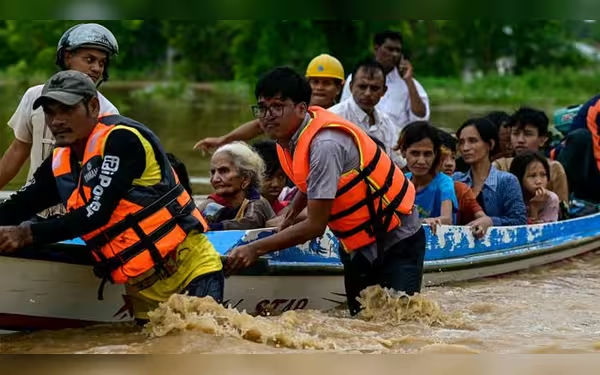Saturday, November 16, 2024 03:18 PM
Typhoon Yagi Causes Catastrophic Flooding in Myanmar
- Death toll from Typhoon Yagi rises to 226.
- Over 640,000 acres affected by devastating floods.
- UN reports urgent need for humanitarian aid.
 Image Credits: geo
Image Credits: geoTyphoon Yagi's aftermath in Myanmar has led to 226 deaths and severe flooding, prompting urgent humanitarian aid needs.
Typhoon Yagi has wreaked havoc across Southeast Asia, particularly in Myanmar, where the aftermath of the storm has led to devastating flooding. As reported by state media, the death toll has tragically climbed to 226, doubling from the previous count of 113 fatalities. This catastrophic event has left 77 individuals still unaccounted for, raising concerns about the ongoing impact of the disaster.
The flooding, which has affected a staggering 640,000 acres of land, has destroyed vital rice paddies and other crops, threatening food security in the region. Typhoon Yagi swept through northern Vietnam, Laos, Thailand, and Myanmar over a week ago, bringing with it powerful winds and an overwhelming amount of rain. The resulting floods and landslides have claimed the lives of over 500 people across these countries, according to official figures.
The United Nations Office for the Coordination of Humanitarian Affairs (UNOCHA) has reported that approximately 631,000 people have been affected by the flooding in Myanmar alone. The urgent need for food, clean drinking water, shelter, and clothing has been highlighted, as blocked roads and damaged bridges severely hinder relief efforts. Communication challenges, especially in remote areas, have further complicated the situation, delaying the flow of information regarding casualties.
Reports indicate that more than 150,000 homes have been flooded, prompting the military junta to establish over 400 relief camps to assist those displaced by the disaster. The UN's World Food Programme has described the floods as the worst in Myanmar's recent history, although specific details have not been disclosed. Previous severe flooding events in 2011 and 2015 resulted in over 100 deaths each time, while Cyclone Nargis in 2008 left more than 138,000 people dead or missing.
In a rare move, the junta issued an appeal for foreign aid over the weekend, with UNOCHA emphasizing the urgent need for additional resources. However, it is important to note that in recent years, Myanmar's military has often obstructed or delayed humanitarian assistance from abroad. This was evident after Cyclone Mocha last year when travel authorizations for aid groups were suspended, preventing them from reaching nearly a million people in need.
Even before the floods, the people of Myanmar were already facing significant challenges due to three years of conflict between the military junta and armed groups opposing its rule. Millions have been displaced from their homes, compounding the humanitarian crisis in the country.
As the situation continues to unfold, it is crucial for the international community to respond swiftly and effectively to the needs of those affected by Typhoon Yagi. The resilience of the people in Myanmar is commendable, but without adequate support and resources, the road to recovery will be long and arduous. It is a stark reminder of the importance of global solidarity in times of crisis, as communities come together to rebuild and heal.













